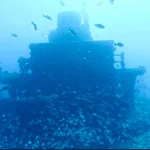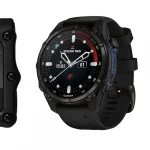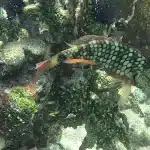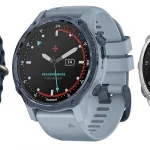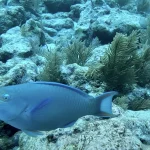Table of Contents
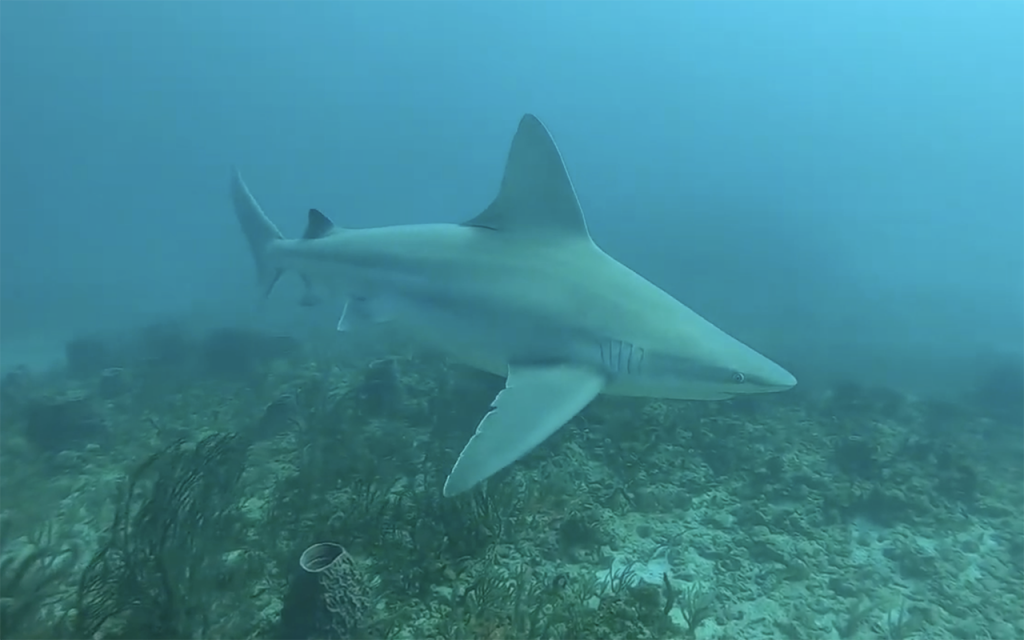
Divers, especially those interested in spearfishing, are warned to be cautious due to the presence of bull sharks.
Article at a Glance
- Location: The Quallman Tugs wreck is situated off the coast of Pompano Beach, Florida, and is part of a larger dive site known as the “Wreck Trek.”
- Composition: The site features two 32-foot long pusher tugs, dredge pipe pontoons, fiberglass yacht hulls, and two steel sailboat hulls, including the historically significant Alpha.
- Historical Context: The original tugs were intentionally sunk on January 4, 1985, while the Alpha, an 85-foot steel sailboat used in World War II, was added to the site on February 28, 1988.
- Diving Experience: The wreck is accessible to advanced divers and offers a depth of approximately 24 meters (79 feet), making it suitable for exploring various structures and marine life.
- Marine Life: Divers can expect to see a variety of marine species, including grouper, hogfish, and potentially bull sharks, which add excitement to the diving experience.
- Safety Considerations: Divers should be aware of depth limits, potential currents, and the presence of marine life, particularly sharks, while exploring the wreck.
- Local Dive Shops: Several dive shops in Pompano Beach, including DH Scuba, AquaLife Divers, and South Florida Diving Headquarters, offer trips to the Quallman Tugs wreck, providing guided experiences for divers.
Shipwreck Location Coordinates and Depth
Depth
The depth of the Quallman Tugs wreck is approximately 24 meters (79 feet). The wreck site is described as being in a depth range of 60-80 feet.
Location Coordinates
Latitude: 26° 13.857′ N
Longitude: 80° 04.027′ W
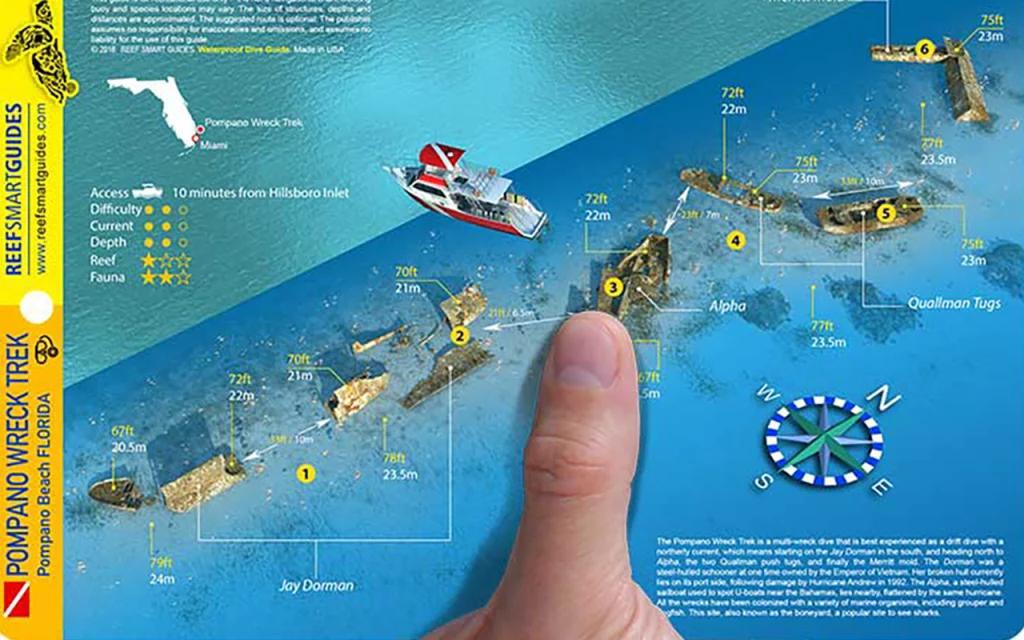
What Do Scuba Divers Say About This Ship
Diverse Wreck Site:
Divers likely appreciate the variety of structures at this site, which includes:
- Two 32-foot long pusher tugs
- Dredge pipe pontoons
- Fiberglass yacht hulls
- Two steel sailboat hulls1
Historical Interest:
Some divers may be intrigued by the site’s history:
- The original tugs were sunk on January 4, 1985
- The Alpha, an 85-foot sailboat added later, was used in World War II to spot submarines near the Bahamas1
Marine Life:
The site is known to attract various marine life:
- Bull sharks are sometimes spotted here, which could be exciting for some divers but concerning for others1
- The wreck likely hosts a variety of fish and other marine organisms typical of artificial reefs
Diving Conditions:
While exact depth isn’t provided for Quallman Tugs, divers might note:
- It’s likely in the 70-110 foot range, based on nearby wrecks
- The site is sometimes called the “Bone Yard,” suggesting an interesting underwater landscape1
Multi-Wreck Dive Opportunities:
Experienced divers might appreciate that:
- If air and time permit, divers can finish their dive on the adjacent reef1
- The site is part of the larger Shipwreck Park, offering opportunities for multiple wreck dives in the area
What Kind of Marine Life Can Be Found on The Ship
Fish Species:
- Grouper and hogfish are mentioned as common around the wrecks in this area3
- Large schools of fish are likely to be present, as artificial reefs like this often attract various fish species
Sharks:
- Bull sharks are known to frequent this area13
- Divers, especially spearfishermen, are cautioned to be aware of shark presence
Reef Ecosystem:
- As an artificial reef, the Quallman Tugs likely support a diverse ecosystem typical of South Florida waters
- Coral and other encrusting organisms probably cover parts of the wreck, attracting smaller fish and invertebrates
Seasonal Visitors:
- Depending on the time of year, divers might encounter migratory species passing through the area
Nearby Reef Life:
- The site is close to natural reefs, which may contribute to the biodiversity around the wreck
- Divers can finish their dive on the adjacent reef, which likely hosts additional marine life
Key Information
| Attribute | Details |
|---|---|
| Location | Pompano Beach, Florida |
| Sinking Date | January 4, 1985 (original tugs) |
| Composition | – Two 32-foot long pusher tugs – Dredge pipe pontoons – Fiberglass yacht hulls – Two steel sailboat hulls |
| Depth | Approximately 24 meters (79 feet) |
| Notable Addition | Alpha (85-foot steel sailboat) added on February 28, 1988 |
| Historical Significance | Alpha was used in WWII to spot submarines near the Bahamas |
| Nickname | “Bone Yard” (used by some boat captains) |
| Current State | Steel sailboat hulls broken apart by Hurricane Andrew, scattered 75 feet apart |
| Marine Life | Known for bull shark sightings |
| Diving Experience | Part of a larger “wreck trek” area Can finish dive on adjacent reef if air and time permit |
| Suitable For | Advanced open water divers |
| Visibility | 10-30 meters (33-100 feet) |
What Makes The Quallman Tugs Shipwreck a Unique Diving Experience
Diverse Wreck Composition
The site, sometimes called the “Bone Yard,” consists of multiple structures:
- Two 32-foot long pusher tugs (sunk on January 4, 1985)
- Dredge pipe pontoons
- Fiberglass yacht hulls
- Two steel sailboat hulls (added later)1
This variety provides divers with multiple points of interest to explore in a single dive.
Historical Significance
The site has an interesting historical background:
- The original tugs were purposefully sunk in 1985
- One of the steel sailboats, the Alpha (85 feet long), was added on February 28, 1988
- The Alpha has a World War II history, having been used to spot submarines near the Bahamas
Part of a Larger Dive Experience
The Quallman Tugs are part of a “wreck trek”:
- Divers can drift from one wreck to another, including the Jay Dorman and Alpha
- The wrecks are aligned in a north-south line, making for an efficient multi-wreck dive
Marine Life
The site is known for its marine life:
- Bull sharks are frequently spotted here, adding an element of excitement (and caution) for divers
- The artificial reef structure likely attracts a variety of fish and other marine organisms
Accessibility and Versatility
- The wreck is situated in relatively shallow water (estimated 60-80 feet), making it accessible to advanced open water divers
- Its proximity to natural reefs allows divers to finish their dive on the adjacent reef if they have remaining air and bottom time
Photography Opportunities
The site offers interesting subjects for underwater photographers:
- The two tugboats are described as “small ships but photogenic and worth exploring”
- The variety of structures and marine life provide diverse photographic subjects
How Does The Quallman Tugs Compare to Other Shipwrecks in Florida
Historical Significance
Many Florida shipwrecks have significant historical value:
- The Emanuel Point Wreck from 1559 represents the earliest known shipwreck in Florida
- The Atocha and Santa Margarita from 1622 were Spanish treasure ships
In comparison, the Quallman Tugs are more modern vessels, likely with less historical significance than these ancient wrecks.
Treasure and Artifacts
Some Florida wrecks are known for their valuable cargo:
- The Atocha, found in 1985, contained tons of treasure
- The 1733 Nuestra Espana fleet wrecks yielded significant gold and silver
The Quallman Tugs, being modern vessels, are unlikely to contain historical treasures.
Accessibility and Diving Experience
Many Florida wrecks offer unique diving experiences:
- The San Pedro site from the 1733 fleet is now a Florida Underwater Archaeological Preserve
- Some wrecks, like those from WWII, are in deeper waters and more challenging to dive
The Quallman Tugs, being in relatively shallow water and part of a “wreck trek,” likely offer a more accessible diving experience for a wider range of divers.
Marine Life
Florida wrecks often become artificial reefs:
- The San Pedro is described as “one of Florida’s oldest artificial reefs”
The Quallman Tugs, while younger, likely also support a rich ecosystem, especially given its proximity to natural reefs.
Composition
Many historic wrecks consist of a single large ship. The Quallman Tugs site is unique in that it comprises multiple structures, including tugs, pontoons, and sailboat hulls, offering a more diverse exploration experience.
What is The Full History of This Ship
History of the Quallman Tugs
- Sinking Date: The Quallman Tugs were intentionally sunk on January 4, 1985.
- Site Composition: The site consists of:
- Two 32-foot long pusher tugs
- Dredge pipe pontoons
- Fiberglass yacht hulls
- Two steel sailboat hulls (added later)
- Addition of the Alpha:
- A steel sailboat named Alpha (85 feet long) was added to the wreckage on February 28, 1988.
- The Alpha has historical significance, as it was used in World War II to spot submarines near the Bahamas.
- Nickname: The site is sometimes referred to as the “Bone Yard” by some boat captains.
- Current State: The two steel sailboat hulls (likely including the Alpha) were broken apart by Hurricane Andrew and are now scattered 75 feet apart, bow to bow in several pieces.
- Location: The wreck is located off Pompano Beach, Florida.
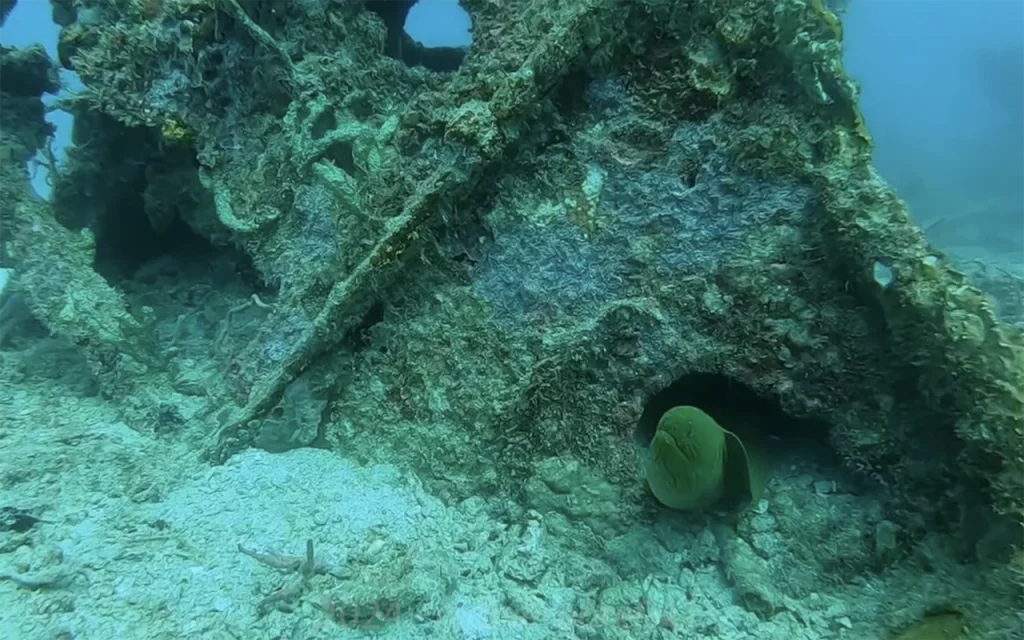
What Historical Features Can Still Be Identified on the Quallman Tugs Wreck
- Two 32-foot long pusher tugs: These are the original Quallman Tugs, sunk on January 4, 1985. They form the core of the wreck site.
- Dredge pipe pontoons: These structures are part of the original sinking and should still be identifiable.
- Fiberglass yacht hulls: Also part of the original wreck composition.
- Two steel sailboat hulls: Added later to the site, but significantly altered by Hurricane Andrew.
- The Alpha: An 85-foot long steel sailboat added on February 28, 1988. It has historical significance as it was used in World War II to spot submarines near the Bahamas.
- Scattered debris: The steel sailboat hulls (likely including the Alpha) were broken apart by Hurricane Andrew and are now scattered 75 feet apart, bow to bow in several pieces.
- The Dorman: One of the steel sailboats, lying on its port side, broken up and pointing north.
- The flattened Alpha: Described as “flattened” in its current state.
What Safety Measures Are in Place for Divers Visiting the Quallman Tugs
- Depth Awareness: The wreck is located at a depth of approximately 24 meters (79 feet). Divers should be aware of this depth and plan their dive accordingly, considering bottom time and decompression limits.
- Skill Level: While the site is described as suitable for “all divers”, the depth suggests that it’s more appropriate for advanced open water divers or those with wreck diving experience.
- Visibility: The site has a visibility range of 10-30 meters (33-100 feet). Divers should be prepared for varying visibility conditions and use appropriate equipment like dive lights.
- Marine Life Awareness: The site is known for various marine life, including bull sharks. Divers, especially spearfishermen, are cautioned to be aware of shark presence.
- Navigation: The wreck is part of a larger “wreck trek” area. Divers should be aware of their position and use proper navigation techniques to avoid getting lost or separated from their group.
- Wreck Condition: Parts of the wreck, particularly the steel sailboat hulls, were broken apart by Hurricane Andrew. Divers should be cautious of sharp edges or unstable structures.
- Entry Method: The site is described as having a “shore” entry, which may require specific entry and exit techniques.
- Current Awareness: Given that this is part of a drift dive area, divers should be aware of current conditions and plan their dive accordingly.
- Dive Planning: If divers plan to visit multiple wrecks in the area, they should carefully plan their air consumption and bottom time.
- Equipment Considerations: Given the presence of multiple structures and potential for entanglement, proper wreck diving equipment (like dive lights, redundant air sources, and cutting tools) would be advisable.
Dive Shops That Provide Diving Trips to This Shipwreck
- DH Scuba
- Address: 840 SE 22nd Ave, Pompano Beach, FL 33062
- Phone: (954) 294-5600
- Website: https://www.dhscuba.com
- AquaLife Divers Inc.
- Address: 2705 N Riverside Dr, Pompano Beach, FL 33062
- Phone: (954) 231-3483
- Website: http://www.aqualifedivers.com
- South Florida Diving Headquarters
- Address: 101 N Riverside Dr # 111, Pompano Beach, FL 33062
- Phone: (954) 783-2299
- Website: http://www.southfloridadiving.com
Central Florida Wrecks
- SS Breconshire
- Georges Valentine
- Hog Heaven
- Urca De Lima
- USS Rankin
- Ana Cecilia
- United Caribbean
- USS Mindanao
- The Laertes
- Berry Patch Tug Wreck
- The Liberty Ship
- The Ana Cecilia
- The Cities Service Empire
- USS Accokeek
- The Tortuga Wreck
- Princess Ann Wreck (Palm Beach)
- Okinawa Wreck (Pompano Beach)
- MG-111 Wreck (Jupiter)
- Lady Luck Wreck (Pompano Beach)
- Rodeo 25 Wreck (Pompano Beach)
- Lowrance Wreck (Pompano Beach)
- RSB-1 Wreck (Deerfield Beach)
- Rebel Wreck (Deerfield Beach)
- Noulla Express Wreck (Fort Lauderdale)
- Sucre Wreck (Fort Lauderdale)
- Captain Tony Wreck (Pompano Beach)
- Peter McAllister Wreck (Pompano Beach)
- Guy Harvey Wreck (Fort Lauderdale)
- Quallman Tugs Wreck (Pompano Beach)
- Miller Lite Wreck (Pompano Beach)

